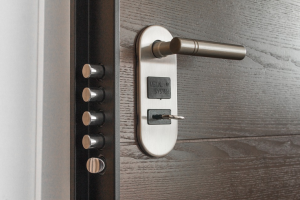
State-of-the-art home security systems are not your only option – there are many inexpensive ways to protect your home because home security is paramount. Even if you have a sizable budget for home security, you’d be foolish to overlook the inexpensive measures that are the cornerstone of your home security. Here are the best free and inexpensive anti-theft measures that you can implement immediately.
Keep Doors and Windows Locked
Good habits simply go a long way. Home burglary statistics indicate that many burglars are just looking for easy targets most burglaries occur during daylight hours (between 10 a.m. and 3 p.m.) and are usually completed within 8-10 minutes. 34% of thieves enter through the front door, while another 23% enter through a second-floor window. Burglars look for easily accessible properties in homes that are likely to be vacant. Always lock your doors and windows when you’re not using them, even if you’re home.
Upgrade House Locks
 Locks are integral part of home security. If it’s been a while since you’ve updated your locks, make a checklist: are some of the locks broken, could there be extra keys in the hands of strangers, are some of the exterior locks easy to pick, force, or open? If you answered yes to these questions, it might be time to change the keys in your locks and replace them with much more tamper-resistant versions. To start, make sure all exterior doors have ANSI Grade 1 or Grade 2 deadbolts.
Locks are integral part of home security. If it’s been a while since you’ve updated your locks, make a checklist: are some of the locks broken, could there be extra keys in the hands of strangers, are some of the exterior locks easy to pick, force, or open? If you answered yes to these questions, it might be time to change the keys in your locks and replace them with much more tamper-resistant versions. To start, make sure all exterior doors have ANSI Grade 1 or Grade 2 deadbolts.
Secure Doors, Windows, and Hardware
 Do you think your locks are rock solid even though your doors, windows, or hardware are weak and brittle? A well-placed punch or kick can bring someone down in moments. Check all entry points, especially on the second floor, and then replace, repair or reinforce as needed. You can add extra support with a door barrier or safety barrier. Make sure the strike plate (the metal part of the jamb where the lock bolt moves) is securely installed with at least 3/4-inch screws.
Do you think your locks are rock solid even though your doors, windows, or hardware are weak and brittle? A well-placed punch or kick can bring someone down in moments. Check all entry points, especially on the second floor, and then replace, repair or reinforce as needed. You can add extra support with a door barrier or safety barrier. Make sure the strike plate (the metal part of the jamb where the lock bolt moves) is securely installed with at least 3/4-inch screws.
This measure can help prevent the deadbolt from being easily driven into the jamb. On the other hand, door psychology kits include strike plates and other hardware that can reinforce a door’s weak points. Sliding doors include a square lock that puts a block in the jamb to prevent the door from sliding. Also, include window guards, grilles, or use this log for other burglar-resistant ideas.
Use Sensitive Lights
Change regular lights to motion-sensing lights by switching to motion-sensing bulbs or simply screw a motion-sensing adapter into a regular bulb and socket. On the outside, stand out to anyone exploring your home, and visibility may be enough to keep potential intruders at bay. If they venture inside, the indoor varieties will make it difficult for them to maneuver. Learn more about how to deter burglars with light.
Hide Your Keys and Keep Your Valuables
Hiding a key in a predictable place, like under the doormat or in a potted plant by the door, makes it easy for opportunistic thieves. Instead, give a leftover key to a trusted neighbor and then look for an alternative, unexpected hiding place, or better yet, get an inexpensive mixed lockbox and install it in a hidden location. It doesn’t cost anything to be a little more careful. Also, don’t be flashy with your expensive items. Outside, keep your gear, bikes, and other easy-to-grab items under lock and key or protected from the garage when you’re not using them. Inside, use window treatments, such as curtains or blinds, to keep passersby from spying on your home. Likewise, put away valuables when you’re not using them. Don’t leave jewelry, electronic devices, cash, or important personal documents in plain sight. Keep your most valuable possessions and documents in a secure home.…


 Before you begin work, determine how much your favorite remodeling job will cost overall. Then, make yourself a budget, preferably by a small margin, because it’s not uncommon for projects to go over budget. Once you have your budget, make sure you have a way to come up with the money. If you don’t have cash, consider cash-out refinancing.
Before you begin work, determine how much your favorite remodeling job will cost overall. Then, make yourself a budget, preferably by a small margin, because it’s not uncommon for projects to go over budget. Once you have your budget, make sure you have a way to come up with the money. If you don’t have cash, consider cash-out refinancing. Communication is key, and with your builders, it is no exception. The renovation of your home is the view, and you are the only person who knows what you want. If there is something you would like done differently, say so. The worst they can say is no, give an alternative option as well. Also, establish a communication strategy together before the builders get to work. Large home improvement jobs require a lot of back and forth, so it’s important to get familiar with the contractor before the work begins.
Communication is key, and with your builders, it is no exception. The renovation of your home is the view, and you are the only person who knows what you want. If there is something you would like done differently, say so. The worst they can say is no, give an alternative option as well. Also, establish a communication strategy together before the builders get to work. Large home improvement jobs require a lot of back and forth, so it’s important to get familiar with the contractor before the work begins.